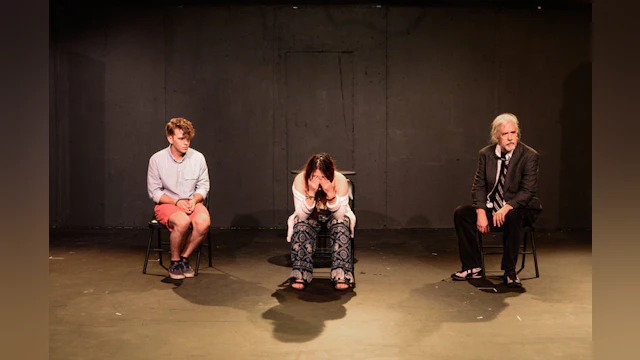Danté Belardinelli, Robert Sprayberry, and Trang Le in the short play “Sinatra” written by Blake Lewis and directed by Claudia Doumit. Photo by Julio Javier Vargas.
December 22, 2017 – Suicide broke my heart. I imagine it’s broken a lot of hearts. The ripple it has is huge. For months after my dad died, I heard from people as word slowly traveled to the tiniest corners of his life. People he had met decades ago or only a handful of times were moved enough by his death to call me, a stranger, and share a memory or give a condolence. It filled me with a warm sadness. It felt good knowing he was remembered, and it hurt being reminded he was gone.
All these people…and yet it still felt wrong to talk about it. Shameful, even. There’s a certain tinge of ickiness that hangs in the air when suicide is mentioned. I’ve had people physically recoil from me when I reveal his cause of death, as if they hadn’t been rude enough to ask in the first place.
The most common response was denial. I can’t count the number of times I’ve been told, “But he was so happy,” or, “He would never leave you girls.” He wasn’t, and he did. Maybe that sounds harsh to put it so bluntly, but avoidance and denial played a big part in my dad’s story. We’re conditioned to do that – to present our best, happiest selves to the world while denying our pain. It’s a problem in our culture that needs to change. We’ve given underserved power to suicide and mental health conditions by letting them lurk in the dark. To take that power away, we have to talk about it.
It sounds simple, but it’s not. I had to learn to talk about it. In the beginning, my dad’s death felt like a dirty secret. I felt defined by it.
So, I ran.
I fled Dallas and came to Los Angeles to study acting. I no longer wanted to be the girl whose dad died by suicide; but I quickly learned that I couldn’t run from that part of me forever. Acting forced me to confront the shattered pieces of my heart that I had ignored for so long out of shame and fear. Freely telling someone else’s story meant that I had to face those deep things within me. It wasn’t easy.
Living with my grief tucked away had become familiar. Change is scary – even positive change. Acting reminded me to breathe, and breathing reminded me to feel. I learned to talk about my loss and to listen. I learned to let myself heal.
And as I healed, I began to want to use my love of theater to help others. I wanted to find a way to use it to connect with, and reach out to, others struggling with mental health conditions and the after-effects of suicide. So, in March of 2016, I created A Light in Dark Places: A Collection of Plays for Hope in collaboration with the Stella Adler Academy of Acting and Theatre – Los Angeles, as part of National Suicide Prevention Week.
I had never produced a play before, let alone the five that I ended up with, but I found that I had a lot of help. A former teacher of mine, Bruce Katzman, helped me find the shape, and Salim Aliaga (co-producer) helped me keep the heart and my sanity. It was a process, but what we ultimately came up with was a production made up of five original, short plays followed by a Q&A and a reception during which people were encouraged to connect. Our hope was to open up discussion, build community, and provide resources to those in need. The success of that initial weekend encouraged us to make A Light in Dark Places a yearly event. We just closed our second year this past September, and I’m already looking forward to the next.
I’m not going to pretend that every day is easy. For me, healing is learning to deal directly with my loss and accept the days that are good along with the days that are bad, without judgment. It’s about knowing when to reach out. Creating A Light in Dark Places definitely has helped with that. Suicide affects so many of us; but for the longest time, I felt alone in my loss. I now know that I am not.
We don’t have to be experts to help others. We can all make a mark by encouraging each other to speak more openly about mental health and suicide. A kind word or attentive ear can have just as much impact as producing a play series. It’s about the willingness to open yourself up, to communicate, and to listen. Talk about it. Reach out. These simple actions are huge, and it’s through them that we can all be a light in the dark.
